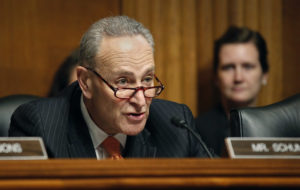
Sen. Charles Schumer, (D-N.Y) makes opening remarks during a hearing attended by a panel of Department of Homeland Security senior officials John Wagner, deputy assistant commissioner of the U.S. Customs and Border Protection’s Office of Field Operations; Anh Duong, director of Border and Maritime Division of Homeland Security’s Advanced Research Projects Agency; Craig Healy, assistant director of Immigration and Customs Enforcement’s National Security Investigations Division; and Rebecca Gambler, director of Homeland Security and Justice Issues of the U.S. Government Accountability Office, as they deliver testimony on the unimplemented biometric exit tracking system before the Senate Subcommittee on Immigration and the National Interest, in Washington, D.C., Jan. 20, 2016. (CBP Photo by Glenn Fawcett)
While millions of Americans are suffering from the effects of inflation, it’s disingenuous and a bit insulting to call a run-of-the-mill tax and spending bill out of Washington, D.C. the “Inflation Reduction Act of 2022.” It has almost no chance of reducing inflation and has much more potential of making it worse. But, leave it the Senate Majority Leader Chuck Schumer and Sen. Joe Manchin (D-WV) to do just that. It’s the classic D.C. tactic of putting lipstick on a pig. The Wall Street Journal’s editorial board writes:
Talk about bad timing. As the economy slouches near recession, Majority Leader Chuck Schumer and West Virginia Sen. Joe Manchin late Wednesday unveiled a tax-and-spending deal that they call the Inflation Reduction Act. Is their aim to reduce inflation by chilling business investment and the economy?
Mr. Manchin is selling the deal as deficit reduction and a rescue for fossil fuels. If he believes this, he hasn’t thought through the impact of the 725-page bill. A more accurate name would be the Business Investment Reduction and Distortion Act since that will be the result of its $433 billion in climate and healthcare spending, and $615 billion in new taxes and drug price-control “savings.”
Start with the 15% minimum tax on corporate book income over $1 billion, which Democrats claim will raise $313 billion through 2031. This new alternative minimum tax will slam businesses whose taxable income is lower than the profits on their financial statements owing to the likes of investment expensing, tax credits and business deductions.
Many companies pay less than the 21% corporate tax rate because they can expense investments under the tax code up-front. Hence, the new tax will increase the cost of business investment and—irony alert—the Tax Foundation forecasts the coal industry would be hardest hit. Yet green-energy tax credits would be exempt from the new tax.
Businesses will have more incentive to sink money into green ventures whether or not they are the best uses of corporate capital. This will magnify investment distortions created by the bill’s $369 billion in climate spending, most of which is corporate welfare.
Companies will get tax credits for spending on wind, solar, critical minerals, biofuels, hydrogen, carbon capture, nuclear, “sustainable” aviation fuel, lithium-ion batteries, electric-vehicle charging stations and more. Auto makers will get $20 billion in cheap federal loans for building “clean vehicle” factories.
The Biden Administration is using regulation to essentially mandate that auto makers churn out electric vehicles. Now taxpayers will subsidize that cost, on top of the $7,500 EV tax credits so affluent Americans can buy more Teslas. The bill removes the 200,000 manufacturer cap for the $7,500 EV tax credit, which GM, Tesla and Toyota have hit and Ford soon will.
Last year’s infrastructure bill provided tens of billions of climate pork for states. Now they get a second helping. Democrats are also giving Energy Secretary Jennifer Granholm’s green venture-capital fund a $40 billion infusion. How many Solyndras will that fund?
All of this will steer private investment into green energy at the cost of reduced investment in fossil fuels. Wind and solar subsidies are already creating distortions in power markets that make the electric grid less reliable and energy more expensive. The expansion of subsidies will compound these problems.
Most climate spending also comes with prevailing wage and domestic content requirements that will drive up project costs. How will this help reduce inflation?
The Schumer-Manchin deal is also a raid on drug companies. The bill will require the Health and Human Services Secretary to “negotiate” Medicare prices—i.e., impose price controls—for dozens of drugs. But the $288 billion in putative savings are fanciful. Manufacturers will hedge potential future losses by launching drugs at higher prices.
Generic manufacturers say price controls will dampen their incentive to develop copycats, which will result in higher prices for all drugs down the road. The bill will also discourage investment in innovative treatments that could reduce future healthcare spending.
Democrats plan to use the phantom savings to extend sweetened Affordable Care Act subsidies for three years. The subsidies are sure to be extended again in 2025, and their cost will grow as insurers raise premiums to pocket the larger payments.
Speculative revenue of $124 billion will also come from an $80 billion boost for the IRS. Most of this will finance more audits. The rich can afford more tax lawyers, but middle and upper-middle class Americans will be inclined to settle IRS claims, however meritless, lest they spend even more to defend themselves.
Mr. Manchin says that in return for all this he won a commitment from Democratic leaders for a vote this year on a separate bill reforming federal permitting rules for pipelines and the like. The details will be crucial here—not least because there are many ways progressives will try to kill the permitting reforms in Congress, or via regulation and litigation.
Messrs. Schumer and Manchin played GOP Senators for chumps (see nearby), but they’re doing the same to Americans by telling them the bill will reduce the deficit.
Read more here.
